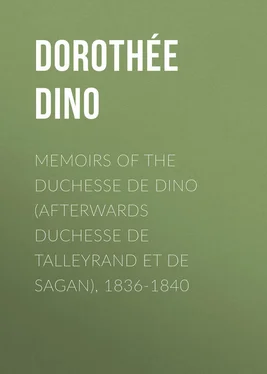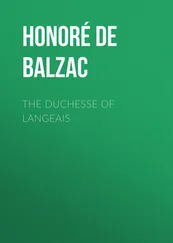Dino Dorothée - Memoirs of the Duchesse de Dino (Afterwards Duchesse de Talleyrand et de Sagan), 1836-1840
Здесь есть возможность читать онлайн «Dino Dorothée - Memoirs of the Duchesse de Dino (Afterwards Duchesse de Talleyrand et de Sagan), 1836-1840» — ознакомительный отрывок электронной книги совершенно бесплатно, а после прочтения отрывка купить полную версию. В некоторых случаях можно слушать аудио, скачать через торрент в формате fb2 и присутствует краткое содержание. Жанр: foreign_antique, foreign_prose, на английском языке. Описание произведения, (предисловие) а так же отзывы посетителей доступны на портале библиотеки ЛибКат.
- Название:Memoirs of the Duchesse de Dino (Afterwards Duchesse de Talleyrand et de Sagan), 1836-1840
- Автор:
- Жанр:
- Год:неизвестен
- ISBN:нет данных
- Рейтинг книги:4 / 5. Голосов: 1
-
Избранное:Добавить в избранное
- Отзывы:
-
Ваша оценка:
- 80
- 1
- 2
- 3
- 4
- 5
Memoirs of the Duchesse de Dino (Afterwards Duchesse de Talleyrand et de Sagan), 1836-1840: краткое содержание, описание и аннотация
Предлагаем к чтению аннотацию, описание, краткое содержание или предисловие (зависит от того, что написал сам автор книги «Memoirs of the Duchesse de Dino (Afterwards Duchesse de Talleyrand et de Sagan), 1836-1840»). Если вы не нашли необходимую информацию о книге — напишите в комментариях, мы постараемся отыскать её.
Memoirs of the Duchesse de Dino (Afterwards Duchesse de Talleyrand et de Sagan), 1836-1840 — читать онлайн ознакомительный отрывок
Ниже представлен текст книги, разбитый по страницам. Система сохранения места последней прочитанной страницы, позволяет с удобством читать онлайн бесплатно книгу «Memoirs of the Duchesse de Dino (Afterwards Duchesse de Talleyrand et de Sagan), 1836-1840», без необходимости каждый раз заново искать на чём Вы остановились. Поставьте закладку, и сможете в любой момент перейти на страницу, на которой закончили чтение.
Интервал:
Закладка:
Valençay, October 23, 1836. – I have decided to write a short note concerning the castle of Valençay, describing its foundation and history, &c., which I shall dedicate to my grandson, Boson, in the following words: 48 48 This note upon Valençay was printed in 1848 by Crapelet, Rue de Vaugirard, at Paris, with the dedication to which the author here refers. This curious work is quoted by Larousse in his great "Dictionnaire universel du Dix-neuvième Siècle," under "Valençay." It has become scarce, but several copies exist.
"To my Grandson!
"All are agreed that it is disgraceful to know nothing of the history of one's own country, and that undue modesty or undue presumption are possible dangers if one is ignorant of one's family history, but few are aware how greatly the pleasure of inhabiting a beautiful spot is increased by some knowledge of its traditions. Of these three kinds of ignorance the last is undoubtedly of least importance, but it is also the most common; schoolmasters may create the first, parents the second, but only individual taste can lead us to inquire into dates and facts connected with places which are not generally recognised as famous. This inquiry may seem trivial if it is not justified by any interesting recollections of the past, but in such a case as that of Valençay, where the house is well known for its connection with celebrities, it is the less excusable to disregard or to confuse its history, as we are specially called, if not to perpetuate these famous events, at least to respect them.
"It has been a pleasure to make this piece of history easier for your study. May it encourage you to remain as noble in heart and thought as are the glories and the traditions of the ancient place of which I propose to tell you the story."
Valençay, October 24, 1836. – Yesterday I had a very kind letter from the Duc d'Orléans, telling me of the departure of his brother the Duc de Nemours for Constantine. He envies him his dangerous enterprise.
M. the Prince de Joinville was at Jerusalem.
Valençay, October 28, 1836. – All our letters from Paris say that no ceremony has been more imposing than the erection of the Obelisk of Luxor. 49 49 The Obelisk of Luxor was given to King Louis-Philippe by Mehemet Ali, Pasha of Egypt. It was removed from its place before the Temple of Luxor, carried to Paris, and erected in the Place de la Concorde in 1836.
The royal family was welcomed with delight. It was their first public appearance in Paris since Fieschi's attempt, and the people showed their pleasure. The Cabinet hesitated, as in the case of Compiègne, but the royal will carried the day, and with successful results.
Valençay, October 30, 1836. – To-morrow I propose to start from here at eight o'clock in the morning; I shall lunch at Beauregard, 50 50 With the Comtesse Camille de Sainte-Aldegonde.
dine at Tours and sleep at my own house at Rochecotte, where M. de Talleyrand and my daughter will join me on November 2.
Rochecotte, November 2, 1836. – I have not had a moment's rest since my arrival here, as I had to put everything in order before the appearance of the guests whom I am expecting, and to examine the changes that have been caused during my absence by the construction of the artesian well; these changes have greatly improved the immediate neighbourhood of the Castle, though much remains to be done.
I am inclined to think that M. Thiers has uttered some very ill-advised remarks concerning all of us. Ill-temper and despondency usually find unmeasured expression in the case of persons whose early education has been deficient. It was the Spanish question which drove M. Thiers from the Ministry, and on this point he was absolutely opposed to M. de Talleyrand; hence the result. I have no ill-feeling against him; it was bound to be so. Moreover, there are very few people of whom I am sufficiently fond to hate them profoundly.
Rochecotte, November 4, 1836. – What is the meaning of all this Strasburg disturbance? 51 51 On October 26, 1836, Prince Louis Bonaparte, accompanied by his friend M. de Persigny, and supported by Colonel Vaudrey, attempted to begin a military revolt and to overthrow the king, Louis-Philippe.
I am inclined to think there is something serious in this mad Bonaparte enterprise, from the fact that a similar movement took place the same day at Vendôme. Six sergeants began the affair, which was immediately crushed, though one man was killed. I do not know whether the newspapers have anything to say of it, but it is quite certain, as the two prefects of Tours and Blois related it to M. de Talleyrand, who told me the news when he arrived. The Grand Duchess Stephanie will be uneasy concerning the expedition of her cousin, Louis Bonaparte. 52 52 Afterwards Napoleon III.
I am sorry for the Duchesse de Saint-Leu, although I think she had some knowledge of the affair and is more inclined to intrigue than to act a part; but she is a mother, and has already lost her eldest son, and she must feel terrible anxiety; it is a just though bitter punishment for her miserable intrigues.
Rochecotte, November 7, 1836. – Yesterday I had a letter from Madame de Lieven, who tells me that the Emperor Nicholas is indisposed. When a Russian admits that the Emperor is indisposed he must indeed be ill. His death would be an event of very different importance from the outbreak at Strasburg. I do not think the French would have any great reason to regret him.
Rochecotte, November 10, 1836. – Madame Adélaïde informs M. de Talleyrand that the King has resolved not to bring the young Bonaparte to trial; he will simply insist upon his immediate departure for America and exact a formal promise that he will never return to France. Madame de Saint-Leu has written to the King to beg for her son's life. She is known to be hidden at Paris, where the authorities are unwilling to leave her; nor will they allow her to live in Switzerland. Apparently she will go to the United States with her son. What foolishness it is which can lead to such a result!
Rochecotte, November 11, 1836. – Madame de Lieven was saying recently before Pozzo that she would perhaps spend the next winter at Rome. "What on earth would you find to do in Italy?" cried Pozzo. "You could ask no one to tell you the news except the Apollo Belvedere, and if he refused you would say, 'Wretch, away with you!'" This sally of Pozzo's made every one laugh, including the Princess; she is, in fact, quite frivolous.
Rochecotte, November 20, 1836. – Yesterday's letters told of a reversal in the affairs of Portugal. The counter-revolution seems to have failed at the moment when success was thought certain, and the mishap was due to a want of understanding between the little Van de Weyer and Lord Howard de Walden. The disaster is complete.
Madame Adélaïde tells M. de Talleyrand that the Court will certainly not go into mourning for the death of Charles X., as no notification of the event has been received. 53 53 Charles X. had just died at Goritz, in Austria, on November 6, 1836.
She quotes several examples in which mourning was not worn for this reason, though near relatives were concerned, including the case of the late Queen of Naples; she was aunt and mother-in-law to the Emperor of Austria, and died in the Imperial castle near Vienna, but the Austrian Court did not go into mourning because the King of Naples, who was then in Sicily, did not send a notification of his wife's death. Such precedents are invincible.
Rochecotte, November 21, 1836. – The death of Charles X. has divided society in Paris upon every point. Every one wears mourning according to his own fancy, from colours to deep black by infinite gradations, and with fresh bitterness about every yard of crape that seems to be wanting. Some refer to him as the Comte de Marnes and Henry V., others as Louis XIX. In short, the place is a perfect Babel, and they are not even agreed upon the disease of which Charles X. died. Yesterday's letters speak of nothing else, except the affairs of Portugal. We are informed that the clumsy attempt might easily shake the position of Lord Palmerston. 54 54 The Queen of Portugal had been forced, after several outbreaks, to accept the Radical Constitution of 1820. In November she began a counter-revolution, helped by Palmella, Terceira, and Saldanha, believing, at the instigation of England, that the population of Lisbon would support her, and proposing to dismiss her Ministers. She had been wrongly informed concerning the popular feeling, and was forced to abandon the struggle.
Интервал:
Закладка:
Похожие книги на «Memoirs of the Duchesse de Dino (Afterwards Duchesse de Talleyrand et de Sagan), 1836-1840»
Представляем Вашему вниманию похожие книги на «Memoirs of the Duchesse de Dino (Afterwards Duchesse de Talleyrand et de Sagan), 1836-1840» списком для выбора. Мы отобрали схожую по названию и смыслу литературу в надежде предоставить читателям больше вариантов отыскать новые, интересные, ещё непрочитанные произведения.
Обсуждение, отзывы о книге «Memoirs of the Duchesse de Dino (Afterwards Duchesse de Talleyrand et de Sagan), 1836-1840» и просто собственные мнения читателей. Оставьте ваши комментарии, напишите, что Вы думаете о произведении, его смысле или главных героях. Укажите что конкретно понравилось, а что нет, и почему Вы так считаете.












